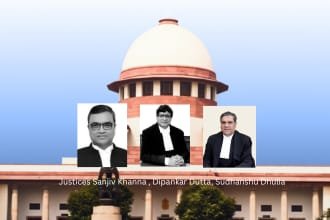The Supreme Court of India on Friday permitted the manufacture of green firecrackers in Delhi ahead of the festive season but made it explicitly clear that their sale within Delhi and the adjoining prohibited areas of the National Capital Region (NCR) will not be allowed. The order comes as the capital and surrounding areas continue to grapple with an alarming air pollution crisis, particularly during and after the Diwali festivities.
This nuanced ruling aims to strike a balance between environmental protection and safeguarding livelihoods in the fireworks industry.
Key Highlights of the Supreme Court’s Order
- Manufacture allowed, sale prohibited: Firecracker manufacturers can continue production of green firecrackers, but they cannot sell them within Delhi or NCR.
- Green firecrackers only: Only firecrackers certified as green by the Petroleum and Explosives Safety Organisation (PESO) and the National Environmental Engineering Research Institute (NEERI) are permitted.
- Undertaking required: Manufacturers must file an undertaking with the Court, ensuring no sale occurs in the restricted regions.
- Balanced approach emphasized: The Court reiterated the need for a solution that accommodates both environmental concerns and economic interests.
- Next hearing scheduled: The matter will be taken up again on October 8, 2025.
Bench Observations
The Bench comprising Chief Justice of India (CJI) BR Gavai, and Justices Vinod Chandran and NV Anjaria noted the importance of balance in policymaking. While acknowledging the health hazards caused by firecracker use, the Court also recognized the employment concerns of manufacturers and sellers.
CJI Gavai remarked:
“What is the problem in allowing them to manufacture if they follow norms? Extreme orders will create problems. Let them manufacture and let there be no sale in NCR till further orders.”
The Court directed the Union Government to come up with a comprehensive, stakeholder-inclusive solution that addresses both environmental and livelihood aspects.
Central Government’s Role
The Court specifically requested the Ministry of Environment, Forest and Climate Change (MoEFCC) to formulate a balanced policy. The Additional Solicitor General of India (ASG) Aishwarya Bhati, representing the Union, highlighted that:
- The Union government had not suggested a blanket nationwide ban.
- The MoEF’s affidavit clarified that there is no complete prohibition on firecrackers.
The Court gave the Central government 10 days to consult all stakeholders—including manufacturers, environmental experts, and state authorities—before presenting a workable framework.
The 2018 Arjun Gopal Case and Precedents
The Supreme Court also briefly addressed concerns regarding its recent directives, which some argued conflicted with its earlier ruling in the 2018 Arjun Gopal case. In that case, the Court held:
- No blanket ban on firecrackers.
- Green firecrackers could be permitted under strict regulation.
Friday’s order aligns with the earlier judgment by allowing manufacture under PESO and NEERI certification while restricting sale in highly polluted zones like Delhi NCR.
Arguments by Counsels
- Senior Advocate K. Parameshwar (for manufacturers): Urged the Court to permit manufacturing, citing adherence to PESO and NEERI norms.
“We can adhere to the norms. There were extensive directions in Arjun Gopal case.”
- ASG Aishwarya Bhati (for Union of India): Emphasized that the government does not support a blanket ban.
- Amicus Curiae Aparajita Singh: Strongly opposed any relaxation, stressing the severe health impacts of firecracker use.
“Even one hour of that exposure sends elderly and infirm people to hospitals.”
The CJI, while acknowledging her concerns, responded:
“Licenses of those violating the ban in prohibited areas should be cancelled forthwith. Stakeholders must come up with a solution acceptable to all.”
Why the Focus on Green Firecrackers?
Green firecrackers are designed to be less polluting, releasing 30% less emissions compared to traditional ones. Developed by the Council of Scientific and Industrial Research (CSIR), these crackers aim to reduce:
- Harmful particulate matter (PM 2.5 and PM 10).
- Noise pollution.
- Emission of toxic gases such as sulfur dioxide and nitrogen oxides.
Despite these advantages, experts warn that even green firecrackers can significantly worsen air quality during already critical pollution periods in Delhi NCR.
Public Health vs. Right to Livelihood
The debate over firecrackers has always revolved around two conflicting rights:
- Right to health and clean environment: Citizens, especially children, the elderly, and those with respiratory issues, face severe health risks during Diwali and winter months.
- Right to livelihood: Thousands of workers and small-scale manufacturers depend on the firecracker industry.
By permitting manufacture but disallowing sale in the NCR, the Court attempts to balance these competing rights.
What Happens Next?
The Court has set the matter for further hearing on October 8, 2025. By then, the Central government is expected to:
- Engage all stakeholders.
- Submit a practical policy balancing health and employment.
- Suggest monitoring and enforcement mechanisms to prevent illegal sales in prohibited areas.
In the meantime:
- Manufacturers with PESO and NEERI certification may continue production.
- Sale remains banned in Delhi NCR.
Conclusion
The Supreme Court’s order reflects its attempt to walk the tightrope between public health and economic survival. While the manufacture of green firecrackers continues, their sale in Delhi NCR remains prohibited due to the acute air pollution crisis. The ball is now in the Union government’s court to craft a stakeholder-driven, balanced solution that can be realistically implemented before the festive season.
The outcome of the October 8 hearing will be crucial, as it will determine whether the country can finally strike a sustainable balance between tradition, livelihood, and the fundamental right to clean air.
Also Read
Supreme Court Stays Coercive Action Against Kerala IT Firm Owner in Sexual Exploitation Case
Supreme Court Rejects PIL Seeking Ban on Salman Rushdie’s The Satanic Verses


